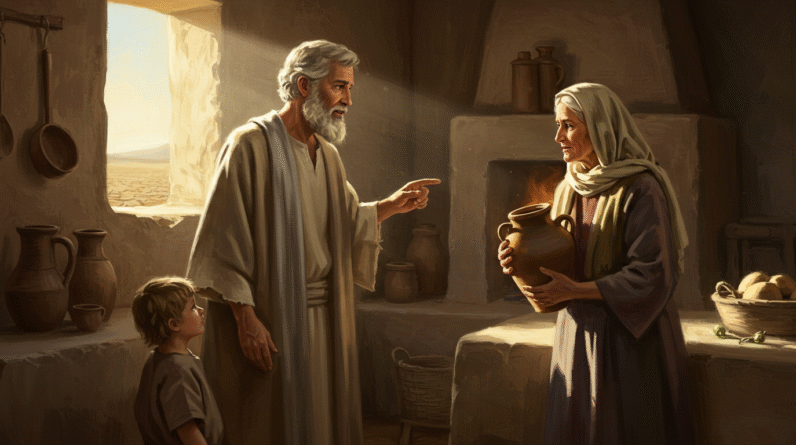Discover the fearless legacy of Jehu, son of Hanani, who boldly confronted Israel’s kings with divine justice. Explore his unwavering courage and timeless lessons.
Jehu Son of Hanani: The Bold Voice Against Kings

Introduction
Jehu, the son of Hanani, is a figure in biblical history known for his fearless proclamations against the kings of Israel and Judah. He serves as an embodiment of prophetic courage and unyielding commitment to divine truth. His story is woven through a tapestry of political intrigue and spiritual degradation during a tumultuous period in Israel’s history. Jehu’s prophetic voice is one that, even today, resonates with themes of justice and divine accountability. A key verse that encapsulates his role is found in 1 Kings 16:7, where the Lord speaks through him to condemn the evil deeds of Baasha, the King of Israel.
Historical Background
Jehu lived during a period in ancient Israel marked by political instability and spiritual decay. The time was punctuated by a series of short-lived dynasties and a pervasive drift from the worship of Yahweh toward the embrace of Canaanite gods. He delivered his prophecies during the reign of Baasha, who ruled over the northern kingdom of Israel. Baasha’s reign, which lasted from approximately 909 to 886 BC, was characterized by acts of violence and idolatry, drawing the ire of the prophet Jehu.
In this volatile setting, Jehu’s prophetic ministry stood out as a beacon of divine mandate. His interactions with the kings were not merely political critiques but were steeped in a religious conviction that the kings’ actions were offensive to the covenantal relationship between Israel and Yahweh. Much of Jehu’s ministry was defined by his encounters with Baasha and other key figures who strayed from their religious duties.
God’s Call and Mission
Jehu’s calling as a prophet was not characterized by dramatic personal reluctance like Moses but rather emerged through the necessity to address the corruption within the monarchy. His main message was one of impending judgment upon the house of Baasha. Unlike the typical reluctant or doubting prophet, Jehu embraced his mission with directness, willing to confront kings and rulers head-on. The word of the Lord came to Jehu pronouncing judgment, which he delivered faithfully, even though the messages were of condemnation and were difficult for the rulers to hear.
In 1 Kings 16:1-4, Jehu receives his unequivocal divine commission, underscoring the absolute nature of his prophetic task. He is tasked with declaring the doom of Baasha’s house for walking in the ways of Jeroboam and causing Israel to sin. It was a clarion call to return to spiritual fidelity and away from idol worship.
Key Events and Prophecies
Jehu’s ministry and its recorded events are few but significant. One of the critical moments in his career is the delivery of the prophecy against Baasha, as explained in 1 Kings 16:2. Jehu categorically states that Baasha, having been raised from the dust to rule over Israel, has failed in his divine responsibilities and led the nation into sin.
Another notable instance is Jehu’s prophecy against Israel, citing the continuity of their moral failures and idolatry. Although the Bible does not provide an exhaustive list of his prophecies, the importance of his messages is manifested through their ultimate realization. His prophecies were indeed fulfilled when Baasha’s family met the exact tragic end described by Jehu, validating the authenticity of his words and confirming them as divinely inspired.
Challenges and Opposition
As a prophet delivering hard truths to power, Jehu inevitably faced resistance. Confronting kings with messages of destruction was not without danger, yet scriptures do not detail specific instances of personal harm or persecution against Jehu. Instead, his challenges lay in delivering messages firmly against the cultural tide of idolatry, where resistance would be more subtle – in the dismissal or disregard of his prophecies.
Furthermore, Baasha’s own response to Jehu’s prophecy is not recorded, but as a king accustomed to exerting his authority, the dismissal would have been likely. Jehu had to contend with the reality that his message was one among many who spoke against the practices deeply ingrained in the ruling and religious structures of the time.
Legacy and Impact
The ministry of Jehu, son of Hanani, left a legacy of divine accountability. His unwavering commitment to deliver the message of judgment against Israel’s kings signaled that their power was ultimately subject to divine sovereignty. His confrontations with kings like Baasha reverberated through the annals of biblical history as a testament to the prophetic office’s role in holding rulers accountable for their covenantal responsibilities.
Though not as frequently mentioned as prophets like Isaiah or Jeremiah, Jehu is remembered for his boldness. His impact is primarily seen in the fulfillment of his prophecies and as a symbol of the unflagging prophetic presence in Israelite history. He also set a precedent for future prophets, illustrating that no ruler was beyond the reach of divine justice.
Lessons from Jehu Son of Hanani
Jehu’s life offers several valuable spiritual lessons. His courage in the face of potentially ferocious opposition stands testament to the power of conviction. The story of Jehu encourages believers today to speak truth to power courageously, a calling that remains relevant in modern contexts where injustice prevails.
Moreover, Jehu’s messages about divine sovereignty remind us that earthly power structures, no matter how established, are ultimately subject to divine judgment. This propels us to reflect on our responsibility to act justly, love mercy, and walk humbly with God. In facing opposition or rejection, Jehu’s unwavering resolve encourages believers to remain steadfast in their faith and committed to God’s mandates, regardless of societal pressures.
Conclusion
Jehu, son of Hanani, is a significant, though oft-overlooked, figure in biblical history. His fearless voice against the malpractices of Israel’s kings serves as a timeless reminder of prophetic authority and tenacity in the face of corruption. Jehu’s story compels us to consider the ways we can embody prophetic courage in our lives and reminds us that God’s truth, when spoken boldly, has the power to transcend temporal authority.
As you ponder on Jehu’s boldness and confrontations, are you ready to stand up for your beliefs even when it’s uncomfortable or opposed? Your journey might not involve royal courts, but it does involve the same call to integrity and justice.
Acknowledgment: All Bible verses referenced in this article were accessed via Bible Gateway (or Bible Hub)







